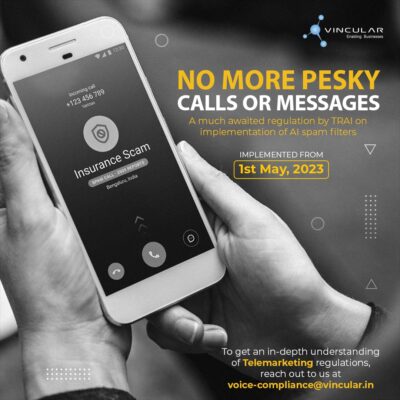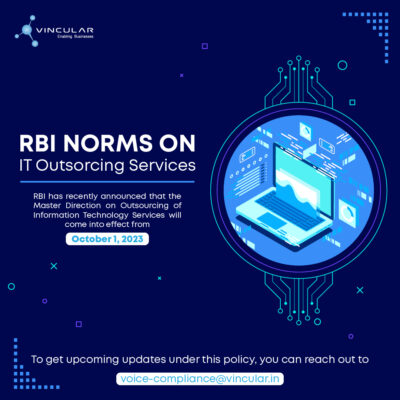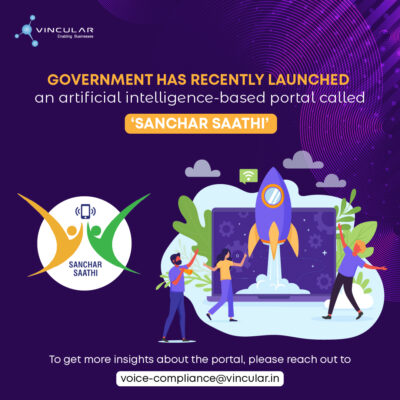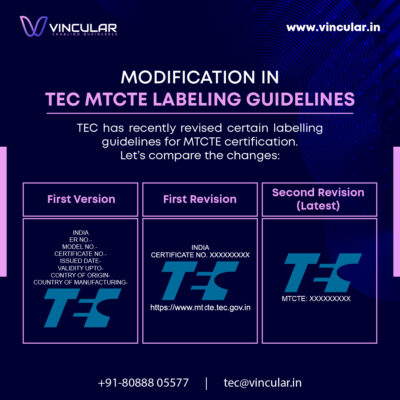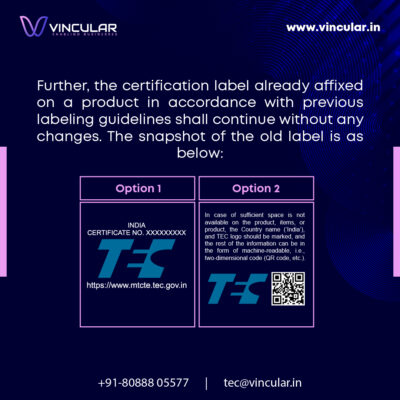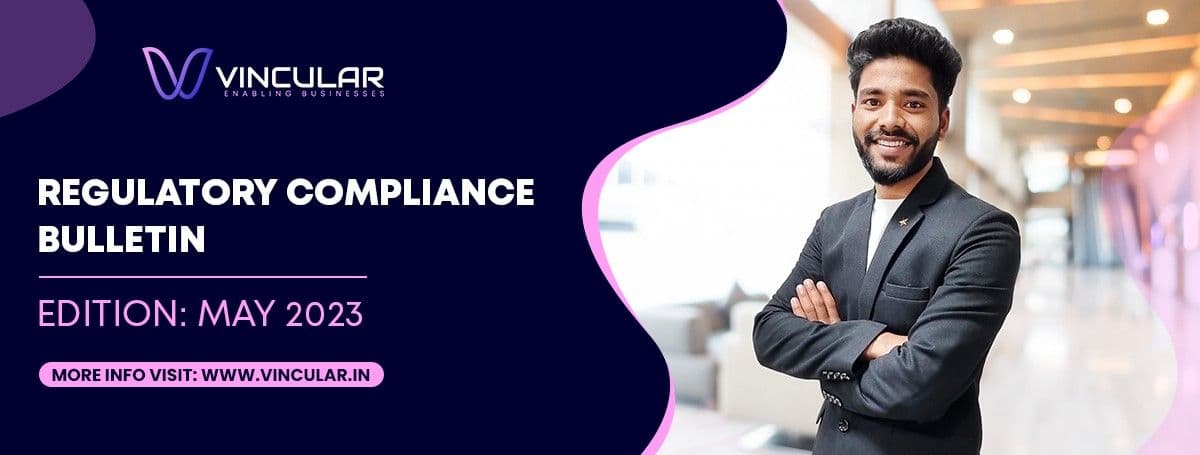
REGULATORY COMPLIANCE BULLETIN (Newsletter- May, 2023)
REGULATORY COMPLIANCE BULLETIN (Newsletter- May, 2023) Voice Compliance TRAI on implementation of AI spam filters Telecom Regulatory Authority of India has implemented a new rule from 1st May 2023 to combat unwanted communication calls and messages from unknown numbers. The move is a significant step by TRAI to protect
REGULATORY COMPLIANCE BULLETIN (Newsletter- May, 2023)
Voice Compliance
TRAI on implementation of AI spam filters
Telecom Regulatory Authority of India has implemented a new rule from 1st May 2023 to combat unwanted communication calls and messages from unknown numbers. The move is a significant step by TRAI to protect consumers in India from fraud and harassment. To safeguard the user from scammers, the AI filters will identify and block fake calls and messages from various sources. Moreover, TRAI is also planning to implement a Call ID feature that will display the photo and name of the caller on the receiver’s handset or mobile phone.
This is a great initiative by the Department of Telecommunications, consumers are hopeful that this action would put a stop to unsolicited voice base communications.
Reserve Bank of India (RBI) norms on IT Outsourcing Service
The Reserve Bank of India (RBI) has recently announced that the Master Direction on ‘Outsourcing of Information Technology Services’ will come into effect from October 1, 2023. According to RBI, the objective of this new policy is to ensure that outsourcing arrangements do not hinder effective supervision and do not diminish the regulated entities’ (REs) ability to fulfill their obligations to their customers.
As per the policy, the REs has been mandated to put in place a risk management framework that comprehensively deals with the processes and responsibilities for identification, measurement, mitigation, management, and reporting of risks associated with outsourcing IT services arrangements. The new policy also incorporates the roles and responsibilities of the board, committees of the board, senior management, IT function, business function, and oversight and assurance functions in respect of outsourcing of IT services.
The new policy aims to bring IT & ITeS tasks under its purview that can significantly impact the business operations of regulated entities in case of any disruption or compromise. It also includes those tasks that can have a material impact on the customers of the entities in case of any unauthorized access, loss, or theft of customer information.
It is important for the industry to comply with regulations and maintain a positive reputation!
Indian Government launches AI based portal ‘SANCHAR SATHI’
The government has recently launched an artificial intelligence-based portal called ‘Sanchar Saathi’ that enables mobile subscribers to trace and block their lost or stolen phones. It can even work with a new SIM and has several features like the personal data on the phones can remain safe.
There are three key modules of this portal; the first is the Centralised Identity Equipment Register (CEIR). CEIR module facilitates tracing of the lost/stolen mobile devices. Once anyone tries to access the blocked phone, traceability is generated and can be traced easily. The second module is Know Your Mobile Connections. If anybody has taken a connection in your name, it can be traced through this feature and can be blocked from here. The third is the implementation of the Artificial Intelligence and Facial Recognition-powered Solution for Telecom SIM Subscriber Verification (ASTR). This feature can be used with the help of AI to determine the number of connections a single person has taken and trace the fraudsters who use someone else’s identity to obtain multiple connections.
Digital India Act is coming soon!
By the month of July, the Union Government will release the first draft of the Digital India Act. The current Information Technology Act (IT Act), 2000 will be replaced by this new legislature. In order to ensure that the Digital India Act provides a thorough IT framework for the nation, the Indian Government will be conducting pre-draft consultations beginning on May 1st and inviting views/comments from as many stakeholders as possible, including citizens, public consultants, and other experts.
The Draft Digital Personal Data Protection Bill, 2022, which was released last year focuses on processing personal data only and works in collaboration with the Digital India Act. But the Digital India Act would provide a new legal framework for data and information protection, as well as new rules for cutting-edge technologies like 5G, IoT gadgets, cloud computing, metaverse, blockchain, and cryptocurrencies. By simulating India’s digital economy, this Act seeks to make India a global digital powerhouse with a trillion-dollar digital economy by 2026.
BEE
Washing machine under voluntary regime extended for more 6 months
Bureau of Energy Efficiency (ऊर्जा दक्षता ब्यूरो) has extended the washing machine’s star labeling table validity by six months, i.e., up to 31st December 2023. All manufacturers who wish to continue their models may submit an application for model continuation before 30th June 2023. No application for a continuation is accepted after the specified date. The updated star rating table is valid from 8th March 2019 to 31st December 2023.
The portal is live from 4th May 2023, for the purpose of continuation of the model. Models whose applications were not submitted by 30th June 2023, will automatically deactivate after this date.
Extension in Production Data Upload filling for FY 2022-23
All the Permittees/Manufacturers registered under the Standards and Labeling scheme of BEE are informed that the timeline to submit the Production Data and pay off the labeling fees for the fiscal year 2022-23 has been extended till 30th June 2023.
In order to prevent penalties and non-compliance, applicants who missed the earlier deadline are urged to follow the new deadline for uploading the production data and pay the labeling fees.
TEC
Exemption against ADLSx and VDSLx interfaces
TEC has recently issued exemptions from testing and certification against the below interfaces/parameters covered under ERs notified by TEC:

The above exemptions are applicable till 30th June 2023. The notification can be uploaded against the above parameters/interfaces on the MTCTE portal during application filing.
Modification in TEC MTCTE Labeling Guidelines
TEC has recently revised some of the labeling guidelines under the MTCTE certification regime. Going forward, these revised labeling guidelines must be followed by stakeholders for their products under MTCTE certification:
1. Clause 9.1 (iii): The TEC certification E-label /physical label:
2. Clause 9.1 (iii): Deleted (Below is the snapshot)
iii. Relevant TEC certification label (India, ER No, Model No, Approval No (Certificate No) with date of issue of certificate, validity of certificate, Country of Origin, Country of Manufacturing and TEC Logo).
3. Clause 9.2: The requirement of labeling on certified products is exempted as per the below scenarios (*whichever is later):
- Exempted for an initial period of 6 months with effect from the date of the TEC MTCTE phase-mandatory date.
- 6 months from the date of issue of the MTCTE certificate
4. Clause 3.2 of Annexure-D:

5. Further, the TEC certification label in accordance with OM. No. 5-10/2021-TC/TEC dated 7th September 2021 already affixed in products shall continue without modifications. The snapshot of the old label is as below:
- The TEC certification label should be on the body of the equipment. Further, the requirement of a label on the packaging is only applicable on products with e-label. However, we would suggest having the TEC certificate information on the packaging as well to avoid issues at the time of import at customs.
- The technical manual of the product should contain the information that ‘the product conforms to the relevant Essential Requirements of TEC, Department of Telecommunications, Ministry of Communications, Govt of India, New Delhi-110001’.
Clarification on Wi-fi CPE ITSAR scope
With data breaches and cyber threats on the rise, the Indian Government is taking many initiatives to build a secure digital environment for organizations and end-users. One such initiative is the COMSEC Scheme, governed by the NCCS under the Department of Telecom. The National Centre for Communication Security (NCCS) is designated for the implementation of the Communication Security Certification Scheme (COMSEC) Scheme which aims at testing Telecom Products for security requirements as per their notified ITSARs. COMSEC, as a part of MTCTE, is mandatory from July 1st, 2023, and product categories like Wi-Fi CPE and IP routers are mandatory for testing for security requirements.
With the implementation date fast approaching, there is an ambiguity amongst manufacturers regarding the applicability of their wireless products under a specific ITSAR. To resolve the same, NCCS has released a notification stating the criteria for the applicability of wireless products under the Wi-Fi CPE category. The notification states that:
“Any Wi-Fi product having the capability of static or dynamic routing or NATing functionality or any packet filtering functionality, irrespective of product name assigned by OEM or the deployment scenario, is covered under the scope of Wi-Fi CPE ITSAR. Hence, Wi-Fi Access Point (AP) with any of the above functionalities falls under the category of Wi-Fi CPE”
With this definition, the Wi-Fi CPE ITSAR covers the products like Wi-Fi Routers, Wi-Fi Modems, Broadband Modems with Wi-Fi facility, Cable Modems with Wi-Fi facility, FTTH ONTs with Wi-Fi facility, and Wi-Fi Data cards that provide Wi-Fi facility with backend 2G / 3G / 4G connectivity.
In a nutshell, for any Wi-Fi product which is covered under the MTCTE scheme, that falls under the above criteria, the OEM should subject their product to security testing under COMSEC as well.
Note: In addition, the IP router ITSAR/category also covers the access/enterprise routers without Wi-Fi.
BIS-ISI
Polyester Staple Fibers (Quality Control) Amendment Order,2023
Department of Chemicals and Petrochemicals has released an amendment to the Polyester Staple Fibers IS -17263. Starting from 3rd April 2023, the Polyester Staple Fibers will be mandatorily implemented under the BIS-ISI scheme.
The new QCO exempts “Low Melt Polyester Fibers” from the provisions of the Polyester Staple Fibers Quality Control Order, 2022.
BIS-CRS
Change in conformity assessment scheme for LV Switchgear products and grouping guidelines
BIS released an official notification on 09th May 2023 for a change in conformity assessment scheme for Low Voltage (LV) Switchgears from Scheme II to Scheme X of BIS. This amendment in the existing notification will be known as Electrical Equipment Quality Control Amendment Order (EEQCO) 2023, and the new notification can be accessed here. Scheme X was launched by BIS on 16th March 2022.
Product categories notified under EEQCO 2023 will be implemented in a phased manner due to test infrastructure limitations. The complete detail of implementation for each category can be referred from Table Column 5.
The product grouping guideline for Circuit Breaker has also been issued and can be accessed from here. For the rest of the categories, the grouping guidelines will be issued by the ministry in due time.
Guidelines for refund of fees submitted for various services under BIS-CRS
BIS has released new guidelines for the refund of BIS fees under various scenarios on 09th May 2023. However, the provision of applying for an online refund was available at the BIS portal since 27th February 2020.
Refund is allowed for the below scenarios:
- Failure of Payment due to Payment Gateway
- Applicant does not want to process the application after successful payment
- Multiple payments (various scenarios)
- Payment after expiry/cancellation of registration due to technical error
- Excess Fee submitted due to technical error
Refund NOT allowed
- Application is rejected/cancelled by BIS due to an un-satisfactory reply.
However, relaxations are given to manufacturers where a refund may be initiated by BIS if:
- Applicant applied for Grant instead of Inclusion or vice versa
- Applicant applied Inclusion and R-number suspended/deferred
In the above cases, the refund will be allowed provided the applicant has raised a request for a refund within 24 hrs of application submission, via e-mail or portal login.
Refund will be made online in the same account from which the fee payment was done.
For the detailed notification, please click here.
Stay updated with our newsletter! Get the latest regulatory Compliance news straight to your inbox – Subscribe Now.
info@vincular.in
+91-8088805577
